Our online personas we build on the internet are digital breadcrumbs of the same persona (Tomas Chamorro-Premuzic, 2017).
Almost all activities that are based on using web tool/applications are ways of creating our digital identities, even when they are not on deliberate (Torres and Costa, 2011).
Relating to our topic on ‘Digital Residents vs Visitors’, a motive is the driving factor in our decision to have an (or several) online identities.
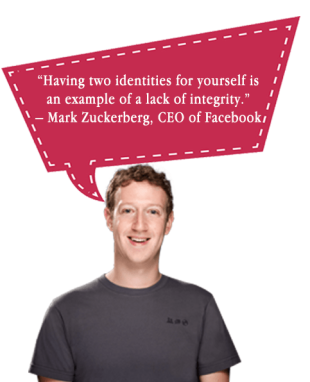
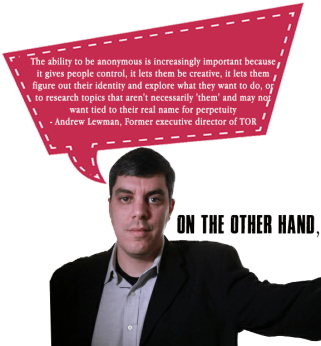
Source: Self-produced, Content by http://www.theguardian.com
Personally, I prefer multiple online identities. I own different accounts showing different parts of me and they are created for unique audiences.
Source: Self-produced
As shown below, it is important to separate my personal and professional identities online to ensure irrelevant details of my personal life are not shown.
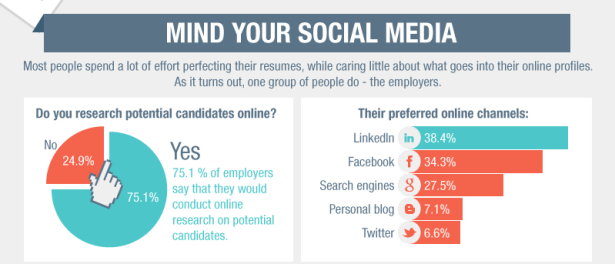
Source: Singapore Jobscentral
Multiple identities may not necessarily be by portraying a different side of us; many online identities have different objectives.
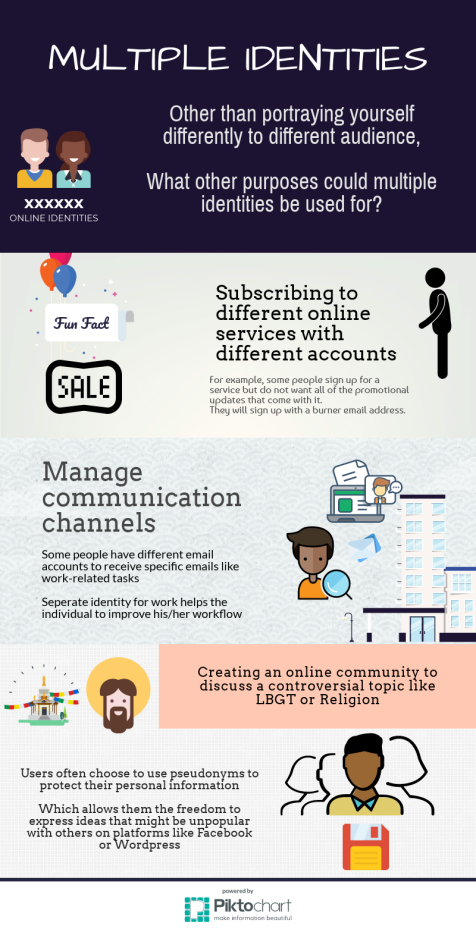
Source: Self-Produced
When discussing authenticity or anonymity, having multiple identities could be viewed as inauthentic, however, it helps to improve privacy and security (FutureLearn, 2017)
Single identity may provide authenticity to individuals especially when engaging in online transactions and banking activities. However, we can argue that despite having one digital identity and being more connected than ever before, we are equally much more vulnerable (Torres and Costa, 2011).
Multiple identities form when the user ‘filter’ their identity to suit specific audiences.
How we behave in a job interview, for example, is very different to how we behave in a bar with our friends on a weekend. This doesn’t mean that one of those identities is more authentic than the other.
Anonymity can be positive as it provides a voice to threatened people while keeping them safe (FutureLearn, 2017). However, it allows irresponsible commenting which might lead to cyberbullying. Cyberbullying has become increasingly problematic in the digital age and we all know its consequences.
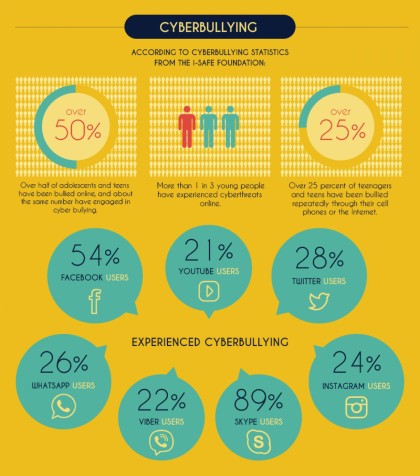
Source: Franklin White
To Conclude,
Source: Self-produced
Word Count: 310
References
Krotoski, A. (2012, April 19). Online identity: is authenticity or anonymity more important? Retrieved November 20, 2017, from https://www.theguardian.com/technology/2012/apr/19/online-identity-authenticity-anonymity
Lee, N. (2016, July 14). Having multiple online identities is more normal than you think. Retrieved November 20, 2017, from https://www.engadget.com/2016/03/04/multiple-online-identities/
P, C. (2016, August 25). Being open on social media: professional roles and online identities. Retrieved November 20, 2017, from https://medium.com/open-knowledge-in-he/being-open-on-social-media-professional-roles-and-online-identities-e502bb8fe479
Prindle, D. (2013, May 16). How to stay anonymous online. Retrieved November 20, 2017, from https://www.digitaltrends.com/computing/how-to-be-anonymous-online/
What is your network identity? – Learning in the Network Age – University of Southampton. (n.d.). Retrieved November 20, 2017, from https://www.futurelearn.com/courses/learning-network-age/3/steps/263025
Costa, C. and Torres, R. (2011) To be or not to be, the importance of digital identity in the networked society. Educação, Formação e Tecnologias, (SI), 47-53.
Curtis, S. (2013, December 11). 10 ways to protect your online identity. Retrieved November 20, 2017, from http://www.telegraph.co.uk/technology/internet-security/10509121/10-ways-to-protect-your-online-identity.html

Hi Jian Wen, nice video for concluding the topic!
Personally, I have adopted the same approach as you since in my opinion privacy outweigh authenticity in that privacy allows individuals to explore our genuine interest without being judged and therefore, it enables us to bring more value to our online networks.
However, we can’t deny the importance of establishing authenticity online supported by your figure stated that around 75% of employers said they would conduct online research on potential candidates.
As we all know, the lack of authenticity may be the main shortcomings of this approach.
Do you have any ideas to overcome it?
Luna
Reference: https://www.theguardian.com/technology/2012/apr/19/online-identity-authenticity-anonymity
LikeLike
Hey Luna!
Thanks for reading and commenting on my blog post! Lacking authenticity is certainly the main shortcomings of this approach. Despite this, I’m still supportive of having multiple identities, drawing a clear line between personal and work purposes.
In order to overcome the perception that having multiple identities relate to not being authentic, I would suggest that we manage the accounts that we use for work consistently. Be it Facebook, Instagram, Linkedin or even Google+, each of them provides opportunities to a specific demographic of customers.
Therefore we have to ensure that little things such as profile image and bio are consistent on our different social networks.
The article below states that, “When a business is noticeably consistent, customers begin to trust them and want to buy from them!”
We have to be aware that we are using these platforms to build our own professional brand identity. We are our own business. Hence, being consistent will gain the trust of our future employers, leading to better management of authenticity!
Hope I have provided relevant insights 🙂
Cheers!
Pay Jian Wen
Source: https://www.ducttapemarketing.com/social-brand-identity/
LikeLike
Hey Jian Wen!
Good work on the infographics and video, it is concise yet easily understood! I really like the flow of this post as well!
While reading your blog, this sentence caught my attention “Multiple identities may not necessarily be by portraying a different side of us”. However, some examples you gave in the infographics are actually contradicting as having a professional email or online community/ forums are in fact another side of us that we might not want to show in our personal/ professional profiles. Furthermore, using pseudonyms meant that you are creating a false persona online, something that you are not in real life. You might want to read this interesting article I found on Wired about reasons why people use false identities online and the idea of ‘sockpuppeteering’. (See here: https://www.wired.com/2014/07/virtual-unreality-the-online-sockpuppets-that-trick-us-all/)
Therefore, I strongly believe that multiple identities are indeed inauthentic as it limits what a person could do or say, sometimes to the extent of falsifying a behaviour to look presentable in front of others. What do you think?
LikeLike
Hey Min Hui!
Thank you for taking the time to read and comment on my blog!
The sentence of “Multiple identities may not necessarily be by portraying a different side of us” simply means that other than using multiple identities to separate the professional and personal sides of us, people actually create multiple identities for other purposes like a burner email to receive promotional emails and etc.
In my opinion, I show different sides of me through my personal/ professional profiles not because I am trying to hide my flaws from my future employers. The reason is that I want to filter out irrelevant details about me that my employers might not be interested in. For example, I do not think that my employer would be interested in what I had for lunch from the photo that I just posted. Instead, they would rather focus on the skills and experience that I have which might bring forth value to the company. Likewise, my friends wouldn’t be interested in how long I have worked in a company for and what capabilities I have. Therefore, my purpose of having multiple identities is to filter out irrelevant details for my professional connections and my social circle.
That being said, a motive is the driving factor in our decision to have an (or several) online identities, which I mentioned in my post! Having multiple identities with the wrong motive can definitely be called out as inauthentic. However, for some people, they have a good motive in creating multiple identities for themselves. For example, some would love to voice out their honest opinions about a controversial topic but they lack the ability to do it for fear of being judged or criticised. Having another identity of him online enable him to voice out his original opinions. With the same opinion, does it makes one identity more authentic than the other? I feel it is not!
Very interesting article you shared there! Regarding your point of using pseudonyms, I would like to link back to the point to the motive behind the action. From the article you shared, it shows that these sockpuppets have a motive to gather information and use that information to help their causes and hurt their enemies. However, I would like to bring up an example of using pseudonyms with a good motive, Joanne Rowling! Or known by readers as J. K. Rowling and Robert Galbraith. She used pseudonyms with the reason for wanting to publish her work without hype or expectation and to receive totally unvarnished feedback.
Therefore, how authentic is having multiple identities? I admit that it is hard to define it. This is because people have different motives in doing so.
Hope my insights are relevant!
Cheers,
Pay Jian Wen
LikeLiked by 1 person
Hi Jian Wen!
Thank you for explaining to me the differences between having a good and bad motive behind a multiple identity. I now understand why you use a multiple identity to separate your personal and professional side, not because of being inauthentic but it is to show the different side of the real you to different audiences!
In conclusion, we all have to be aware that different people have different motives in setting up a multiple identity and not all of them are bad. Am I right?
Cheers!
Min Hui
LikeLiked by 1 person
Hi Min Hui!
I absolutely agree with your conclusion! Thank you for giving me a different perspective too, I would love to hear more insights from you if you would like to discuss further 🙂
Cheers!
Pay Jian Wen
LikeLiked by 1 person
Hey Jian Wen!
Love the infographic you’ve created to explain the purpose of multiple identities, especially the part where people use different identities to discuss sensitive topics.
I had a personal experience with this, where I realize Facebook was not the platform to discuss certain topics that I wanted more people to be aware of it. This was also where I started to have multiple online identities, to show different aspects of myself. This brings me to your video. You’ve mentioned, despite the different identities, you are still showing a level of authenticity, which I agree wholeheartedly.
Most of our views are similar, but I do have one question. You’ve mentioned both benefits and drawbacks of single and anonymous identity. What about having multiple identities? What do you think are the pros and cons of it? Have you had any experience where you’ve decided to adopt multiple identities?
Cheers,
Victoria
LikeLike
Hey Victoria!
Thank you for taking the time to read and comment on my blog!
It is true that despite the different identities, we are still showing a level of authenticity, as we are all showing different breadcrumbs of the same us through different online identities!
As of now, I have adopted multiple online identities on different social platforms. For example, I have two Instagram accounts which are used to update more on my daily life through sharing pictures/videos with my friends and family! The other account is mainly used for generating leads and creating more awareness for a brand! Other examples could be seen from my blog post!
Although having multiple identities have provided various benefits like drawing a clear line between professional and personal life and allowing me to maintain my privacy while doing so, it does lead to several drawbacks as well! Managing several accounts took up way too much effort and time because I have to constantly manage and update them with different contents. As compared to having a single identity, having multiple identities call for better time management on my end!
Having multiple identities also led to the perception of being inauthentic, many may argue that we are not showing our true self but I personally think that showing different sides of me to different audiences does not mean that I am falsifying those sides of mem.
Hope my insights helped!
Cheers,
Pay Jian Wen
LikeLiked by 1 person
Hey Jian Wen!
Time management is definitely a must-have when dealing with multiple identities, otherwise, we would end up neglecting one of them. Thank you for sharing your insights with me!
Cheers,
Victoria
LikeLiked by 1 person
Hey Jian Wen! That’s an interesting post you have here.
I really like the saying ‘our various online personas are all digital breadcrumbs of the same persona; different symptoms of our same core self’. This suggests that although we may have multiple online identities, they are no less authentic as we are just presenting ourselves differently to different target audiences.
Also, your post gave me a deeper insight into the advantages of multiple identities – especially privacy and security. Everyone is vulnerable to security lapses – even tech people: https://www.wired.com/2012/08/apple-amazon-mat-honan-hacking/all/
I believe that we can only secure our own content to a certain extent as there will always be loopholes out there, especially on third-party hosts. What do you think?
Would love to hear your thoughts on this.
Cheers!
LikeLike
Hi Eva!
Thanks for reading and commenting on my post!
I completely agree with your statement that we can only secure our own content to a certain extent. With the number of people affected by phishing, a digital world without a digital literacy could become potentially a world more dangerous than the one we have today (Giacomo Mazzone, 2017). With the number of third-party hosts out there on the internet, how many of them can we trust? I doubt many of them. As more people experienced online hacks and identity thefts, their trust in online interactions on these hosts drops.
I believe to solve this issue, third-party hosts have to step up and be good custodians of user data, and protect our privacy against hackers. Institutions should also work on improving digital literacies of the current generation to adopt appropriate measures against these malicious activities.
Hope my insights helped!
Cheers,
Pay Jian Wen
Source: http://www.pewinternet.org/2017/08/10/theme-6-trust-will-diminish-because-the-internet-is-not-secure-and-powerful-forces-threaten-individuals-rights/
LikeLiked by 1 person
Hello Jian Wen,
Great explanation on online identities! I like the part where you voice out for cyberbullying on the web and create awareness for others. Since cyberbullying is increasingly problematic over the years, do you think cyberbullying is preventable?
I agree with your statement and example on multiple online identities, as I also have multiple online identities where I separate professional and social online identity to prevent any unforeseen judgement. Most of still think that first impression matter the most hence, we need to ‘filter’ what is suitable for each audience.
“The Googles and Facebooks (GoogleBooks?) of the world want to aggregate all of these personas into a single identity.”
This article talks about the aggregation of the personas because Google and Facebook thinks that it is good for us. Will this benefit us? Or do you think that it will create a bigger problem?
(146 words)
Reference:
https://www.wired.com/insights/2014/11/the-online-identity-crisis/
LikeLike
Hey Shih Ying!
Thank you for taking the time to read and comment on my blog!
Speaking about cyberbullying, I believe that there are various measures that could be taken upon to stop it. For people who are at the receiving end, here are some of the measures:
1. Remember that your reaction is usually exactly what the bully wants. It gives him or her power over them. Hence you should not respond to them online
2. Find an outlet to talk to! They could be your family, school teacher, or even external organizations who can provide significant help!
3. Block the bully! If you are constantly receiving harassments through texts, audios or even videos, its good to use privacy tools that many social platforms have offered to protect yourself from them!
4. Don’t be a bully! Make the conscious effort to put yourself in others’ shoes. How would you feel if you are the one bullied? The world needs people to understand the negative emotions which cyberbullying can lead to. Collectively, we can build a better society!
Back on the topic about whether aggregation of personas is good for us. From the article you shared, it is obvious Facebook and Google wants us to have a single identity so that they could increase the effectiveness of ‘Hyper-ads’ which leads to higher profits for them. This could be a negative thing if you are someone who has trust issues with sharing personal information with sites that you are not familiar with. Google and Facebook has been actively pushing users to sign in to different services with a single ID. By doing so, we are giving the permission for them to share our digital footprints and information to the different advertisers.
In the future, I believe that it might lead to a bigger problem if hackers are capable of hacking into their database and retrieve each and every one of our personal information. That would be alarming!
Hope my insights helped!
Cheers,
Pay Jian Wen
Source: https://www.wired.com/insights/2014/11/the-online-identity-crisis/
LikeLiked by 1 person